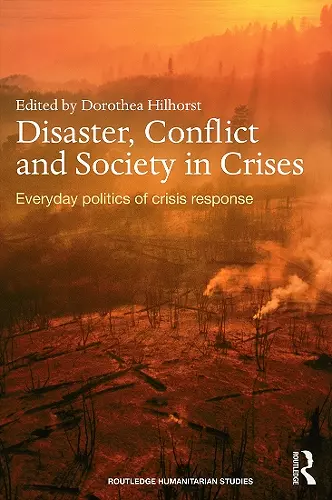Disaster, Conflict and Society in Crises
Everyday Politics of Crisis Response
Format:Hardback
Publisher:Taylor & Francis Ltd
Published:20th Sep '13
Currently unavailable, and unfortunately no date known when it will be back
This hardback is available in another edition too:
- Paperback£41.99(9780415640824)

Humanitarian crises - resulting from conflict, natural disaster or political collapse – are usually perceived as a complete break from normality, spurring special emergency policies and interventions. In reality, there are many continuities and discontinuities between crisis and normality. What does this mean for our understanding of politics, aid, and local institutions during crises? This book examines this question from a sociological perspective. This book provides a qualitative inquiry into the social and political dynamics of local institutional response, international policy and aid interventions in crises caused by conflict or natural disaster.
Emphasising the importance of everyday practices, this book qualitatively unravels the social and political working of policies, aid programmes and local institutions. The first part of the book deals with the social life of politics in crisis. Some of the questions raised are: What is the meaning of human security in practice? How do governments and other actors use crises to securitize – and hence depoliticize - their strategies? The second part of the book deals with the question how local institutions fare under and transform in response to crises. Conflicts and disasters are breakpoints of social order, with a considerable degree of chaos and disruption, but they are also marked by processes of continuity and re-ordering, or the creation of new institutions and linkages. This part of the book focuses on institutions varying from inter-ethnic marriage patterns in Sri Lanka to situation of institutional multiplicity in Angola. The final part of the book concerns the social and political realities of different domains of interventions in crisis, including humanitarian aid, peace-building, disaster risk reduction and safety nets to address chronic food crises.
This book gives students and researchers in humanitarian studies, disaster studies, conflict and peace studies as well as humanitarian and military practitioners an invaluable wealth of case studies and unique political science analysis of the humanitarian studies field.
This volume is a testament to how the study of disaster has come of age. It is a stimulating and innovative set of studies of the intersection of everyday politics with global issues including natural hazards, armed conflict and international assistance policy. Case studies from four continents and thematic chapters draw upon history, anthropology and political science, to integrate the understanding of governance, development and conflict. This book will be an important resource for students and practitioners alike.
–Alex de Waal, World Peace Foundation at the Fletcher School, USA
This is a very useful collection. Each chapter draws important theoretical and policy conclusions from granular ethnographic cases. Together, they unravel a variety of ways that people and institutions engage effectively (or not) to frame and overcome the challenges of survival and governance in disaster, conflict and post-conflict crises.
–Hugo Slim, University of Oxford, UK
Disaster, Conflict and Society in Crises is a timely, important and thematically diverse anthology that brings a holistic perspective to the study of international interventions. It covers policy and practice in the humanitarian arena, and offers a rich array of analysis. Both, academics and practitioners will find much to stimulate their thinking in this book.
–Sultan Barakat, University of York, UK
Dorothea Hilhorst tells us this book describes the everyday politics of disasters, but it does far more than that. It gets right down into the weeds of the way disasters and crises change society and people’s lives. It delves into the ebb and flow of local power, the ways in which governance changes, and how love and deep relationships are shaped. This book provides a beautifully human portrayal of disasters, but with all the rigor of science.
–Peter Walker, Tufts University, USA
This book brings together a timely sociological study of humanitarian crises and aid. It adds value to our understanding of post-conflict/disaster transitions by exploring how local institutions and communities recover. Drawing upon a wide range of case studies, it challenges a number of common assumptions that drive policy and practice.
–David Connolly, University of York, UK
ISBN: 9780415640817
Dimensions: unknown
Weight: 544g
304 pages